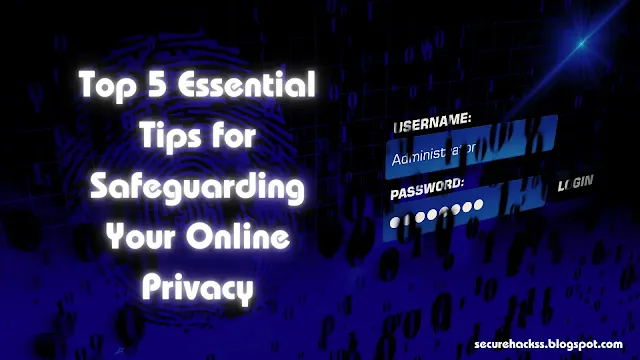Top 5 Essential Tips for Safeguarding Your Online Privacy
 |
| Protect Your Online Privacy |
Safeguarding Your Online Privacy
In an increasingly digital world, protecting your online privacy is crucial. With cyber threats constantly evolving, it’s important to adopt effective strategies to keep your personal data secure. This guide provides actionable tips to enhance your online privacy and stay safe from potential threats.
1. Craft Strong Passwords
Simple passwords are easy for hackers to guess, risking your online accounts.
- Form passwords using a combination of letters, digits, and symbols.
- Use distinct passwords for different websites.
- Utilize a password manager to create and keep track of secure passwords.
2. Enable Two-Factor Authentication (2FA)
2FA provides an additional layer of security by requiring a second form of verification to access your accounts.
- Set up 2FA on all accounts that offer it, using an authenticator app or SMS verification.
- Ensure your backup codes are stored securely.
3. Be Cautious with Public Wi-Fi
Public Wi-Fi networks are often unsecured, making it easier for hackers to intercept your data.
- Avoid accessing sensitive information while connected to public Wi-Fi.
- Use a VPN to secure your internet connection and protect your data on public networks.
4. Regularly Update Software and Apps
Regular software updates fix security flaws and protect against vulnerabilities.
- Enable automatic updates on your devices.
- Manually check for updates on apps and software regularly.
5. Limit Personal Information on Social Media
Oversharing on social media can expose you to identity theft and other privacy risks.
- Don't share personal details like your address or phone number on social media.
- Review and adjust your privacy settings on social media platforms.
6. Use Privacy-Focused Search Engines and Browsers
Traditional search engines and browsers may track your data, while privacy-focused alternatives can help protect your information.
- Switch to privacy-oriented search engines like DuckDuckGo or browsers like Brave.
- Enable ‘Do Not Track’ in your browser settings.
Conclusion
Protecting your online privacy requires a proactive approach. By following these tips—using strong passwords, enabling 2FA, being cautious with public Wi-Fi, keeping your software updated, managing your social media presence, and choosing privacy-focused tools—you can better safeguard your personal data from cyber threats. Start implementing these strategies today to enhance your online security.


